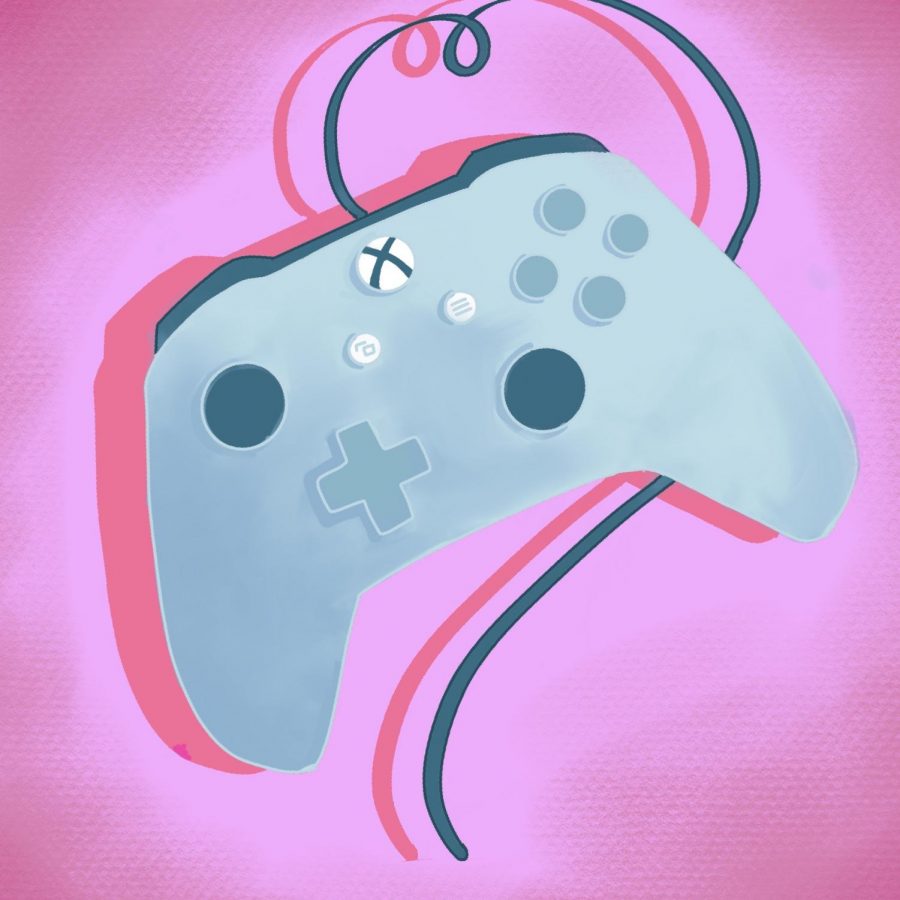Are games to blame for mass shootings?
This article was first published in the October 2019 hard copy edition of the RBHS Clarion. In print, it was abridged to fit spacing constraints. This is the unabridged final draft.
Illustration by Maliana Downing
Video games have gained mass appeal ever since the 1990’s, and being the new media on the block means scrutiny from those already established.
February 1, 2020
By now, I am sure you have heard many reports and conversations about the link between mass shootings, violence, and video games. There are many people in America who believe that games influence the young and impressionable minds who play them to emulate the things done on screen. I, on the other hand, do not think this is true.
From getting a pre-owned PlayStation2 as a kid, to expanding my library to my own PC and a Nintendo Switch, I have been playing games for a majority of my life. Due to my experience, I can tell you without a doubt in my mind that there is no causation between video games and violence.
In my experience, a game has never given me the urge to harm anyone. I may get frustrated when I encounter difficulty, but this can apply to anyone. What a lot of people may not realize is that plenty of games are not even violent. Would you really believe that my hours of playing Tetris could make me more physically aggressive? Of course not.
Granted, I still have had my fair share of experiences with ones that do feature violence, which include but are not limited to: first and third-person shooters, fighting games, beat-em-up games, shoot-em-up games, and RPGs or strategy games. In some, you have direct control over your character and their actions, while in others, your control is looser, only giving commands to characters that then perform the action without any other player input (such as having a Pokemon use a move). The difference here is in manually doing a combo in a fighting game versus just having a party member attack in an RPG. Directly controlling a character allows you to more easily model what they do, so the more action the player has control of, the more likely it is to mimic those actions.
Along with the genre of a game, a game’s tone and general feel should also be noted. Amongst the shooter genre, would you say “Splatoon”, in which you control multicolored squid creatures to spray the other team with ink and cover the ground, was just as violent as “Battlefield”, where instead you are a soldier in a historical fiction setting, killing other players with semi-realistic weapons? Could you say that “Super Smash Brothers”, in which the violence is limited to almost only cartoonish effects, was just as violent as “Mortal Kombat”, where many moves produce blood effects on hit, and some go even further? There are many variables to pay attention to when it comes to judging the effect violence could have on players. How does the game handle violence? Is violence portrayed as something brutal and dehumanizing, is it not given a second thought, or is it glorified in some way?
This is to say that there are so many different games that all work a little differently. They all feel different. A fair amount of games are little to non-violent.
On the other hand, what does it matter how horrible the things on screens are if they do not impact the player in any significant way? Violent crime is one way of measuring how violent a population is.
As reported by the FBI, in between the 1990s to the 2010s, the period in which video games surged in popularity, violent crime in the US has fallen. This trend is present in youth crime, too. Other than that, video games have garnered a bad reputation from certain mass shooters being fans of the especially violent variety. However, in a report issued by the Secret Service in 2002, it was found that only twelve percent of school shooters showed an interest in violent video games. In the past twenty years, among incidents in which ten or more people died, only four out of eighteen shooters had any noteworthy video game habits. It is important that we realize there seems to be a statistical coincidence between the demographics of mass shooters and players of games. While it is primarily young men who play video games, it is also predominantly young adult males who commit these attacks, but there is a little actual link between those two groups.
Psychologists have studied what effects games can have on our minds, too. In an article outlining a study done by researchers at the University of Michigan, the correlation between violent video games and aggressive behavior was weak, at a 0.3. In layman’s terms, at best there was found to be a thirty percent chance that playing violent games would lead to more aggressive behavior. However, this was one of the strongest correlations found out of the most accessible research on the topic. Studies with similar results also very loosely defined aggression, equating it to subjecting someone to a loud sound or giving them spicy food. That is also not to neglect plenty of other studies that indicated no statistically significant relationship between aggression and violent games.
Stepping aside from statistics, my experience with games growing up has been a positive one. Perhaps my parents knew how to regulate my habit better than other parents did, either through being good role models and teaching me correct morals or just by managing which games I could actually play.
I believe that games have done a lot for me. They have helped me think differently, think with greater fluidity. I think they were an outlet for the stress I experienced, and that is likely true for many other kids like me. Most of the friendships that I have today were established on the basis of our shared interest in games. These relationships, if I do say so myself, are healthy and are an important factor in my life. Had it not been for games, I would not have gotten my friends the way I did. I do not think that any of my friends have been negatively affected by the violence in video games.
Video games are like any other media; they have the power to influence us and can shape how we see the world and how we respond to it. The same thing has been said about television and film in the past. If the same reasoning applies to them, then why blame only games? I am a stronger and more driven person thanks to games. I believe that the positive effects this medium has outshone the negative ones. There are so many more things a game can do for you than merely cause you to become aggressive. It can teach you a lesson, or give you a new perspective.
Video games are merely the newest form of art we have come up with. Before it can be accepted like television currently is, it will be scrutinized even if it is unjustified. Games, like all media, have the power of influence. Games have an advantage other media do not, and that is their interactivity. The greatest thing about games is that it is the only kind of media that can give the power to you.



